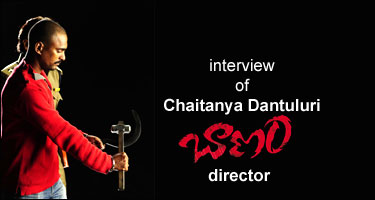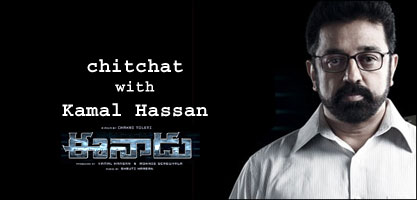
Background:
I was raised in Chennai since I was 3 years old. My father shifted to Chennai at that time with an intention to work in films. He settled as a film journalist and worked for magazines like Vijaya Chitra and Jyothy Chitra for 20 years. He became a freelance writer for films when Telugu film industry shifted to Hyderabad. I joined films after graduation and worked in direction department. I worked for several films in Telugu and Tamil. I learnt a lot during my work for Venkatesh's film Ganesh. I had a close association with Mani Sharma and Marthand K Venkatesh when they were at the beginning of their careers.
Why did it take so many years to become a director?
I was working for films, watching films and criticizing them. The real seriousness was started only after 5 years. I used to write stories just to impress decision makers (heroes and producers). Then I realised that I should do stories honestly. Mani Sharma told me 1 and half years back that he would produce a film in my direction if nothing works out for me. His word gave me the feeling of security. The story of Banam was written at that time. I worked for six months over that script. I narrated it to many people in 2007. I also penned another script. The producers used to like it, but used to say that it won't appeal to Telugu audiences.
I wanted to produce it on myself with funds from my friends. We started a banner called 'Start Camera Pictures'. I wanted to make an independent film. I went to the edge in February 2009. That is when I met Swapna Dutt through a common friend. I gave her a 20-minutes narration. She liked it and referred me to Ashwini Dutt. Ashwini Dutt said that he would produce the film right after listening to the story. He could able to understand and grasp the content of movie immediately. I was little skeptical about Nara Rohith because he comes from a big political family. But once I met Rohith, I am convinced that he is the hero of Banam.
Tell us about Banam?
Banam is a personal film for me. It is about ideology and traits. Banam is about a character's journey towards it's goal. Banam is not about goal, but about the trajectory it travels on.
Technical departments:
I always feel that there should not be any separate department for dialogues. Dialogues should be the part of screenplay and story. But when I met Nagaraju Gandham (Gamyam fame), I could visualize the amount of value he could add to the movie. His contribution for Banam is fabulous. I had long association with Mani Sharma and Marthand K Venkatesh. Both of them gave their best output. Anil Bandhari is a long time friend of mine and he did cinematography.
Vyjayanthi banner is known for mass entertainer and commercial films with crazy combination. The profile of Banam movie looks very much different?
Banam is also a commercial movie made in aesthetic way. I feel that human emotions are same and movies do well if human emotions are presented in effective manner.
What is the runtime of the movie?
It should be around two hours.
Can you tell us about Nara Rohith?
Nara Rohith is a sensible guy with a clear mind. He understood the movie well and gave the right output. He comes from a high-profile political family, but he is down to earth and casual in his approach.
Tell us about producer Seshu Priyanka Chalasani?
She is a young filmmaker and he completed her filmmaking course in USA. She is passionate about doing meaningful cinema. Banam film has limited female characters on screen. Priyanka is my first audience. And her opinion is very important. She got excited about the movie.
Are you tensed about the result?
Not at all. I have completed my job. I am not running a 100 meter routine sprint here. I am aiming at gold medal in a different category. However, I am very curious about how people will react to the movie.
I have a script ready with me. I want to be an independent filmmaker. I want to have a signature of my own in my films.






